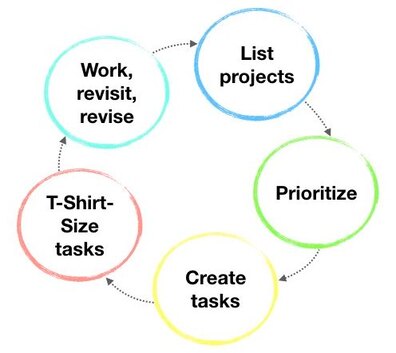|
Do you have an unwieldy, never-ending to-do list? My clients are often frustrated when things on their to-do lists aren’t getting done. They feel that they must be lacking in motivation or self-discipline. While it is possible that motivation or self-discipline can impact your productivity, more often than not, to-do lists become unwieldy because they contain large end outcomes (e.g., “write a book”) without clear, small immediate next steps (“draft a table of contents”). Honing your skills in a technique called T-Shirt-Sizing can help you to make your to-do lists less Herculean. One solution: T-Shirt-Sizing What do I mean by "T-Shirt-Sizing"? At Google, we used the term "T-Shirt-Sizing" as a metaphor for the process of estimating how much work each project or task will take. If a project seems like it might take multiple months, that’s a “Large.” If a project seems like it can get done in an afternoon, that’s a “Small”. T-Shirt-Sizing is a critical skill for making your to-do list...doable. How do I T-Shirt-Size? You can leverage T-Shirt-Sizing once you've identified and prioritized the list of projects that you need to work on. This technique enables you to create and size concrete next steps. I recommend asking yourself three questions to T-Shirt-Size while you’re making your daily to-do list:
How will T-Shirt-Sizing help me?
T-Shirt-Sizing will ensure that the tasks on your to-do list are small enough that they are possible to accomplish. This technique will break a behemoth, Large T-shirt project down into a set of Small T-shirt tasks that will make it easier for you to take action. Once you start taking action, you'll create a sense of momentum so that you feel proud of your progress instead of buried beneath a behemoth. Ideally, your Small tasks will be easily doable in 1 day and will have a clearly measurable result. Here are a few examples:
By practicing making Small tasks and checking how many you’re able to get done, you can revisit and revise your to-do lists until T-Shirt-Sizing serves you. Know someone who could benefit from coaching around time management? Schedule a time for a free chemistry call with me.
0 Comments
Where does your time go?
Are your days filled with reactions? Many of the folks whom I work with on time management run through each day reactively. Here are a few examples of what this looks like:
Sound familiar? In this mode, you may end up getting things done but it's tough to feel productive. Folks in reaction-mode feel like their time is out of their control - like they’re being pulled in too many directions. And they're right. By not setting conscious priorities, it’s easy to waste time even when working long hours. In corporate jobs, there are always plenty of squeaky wheels needing grease. In academia, no one provides a clear roadmap of what needs to be done, so it’s easy to lose days, weeks, or months in limbo. Take control of your time with 3 questions The first step you can take in (re-)gaining control of your time is to consciously prioritize. This involves taking a few minutes to reflect on what's most important - don’t worry, this shouldn’t take more than 5 minutes. Here are 3 questions to help get started on prioritization. If you’re a leader, you can answer these questions for yourself and on behalf of your team.
These 3 questions will enable you to build skills in conscious prioritization and creating realistic milestones. My clients who use these skills begin to see their days shift. Instead of reaction-mode, their days are filled with proactive choice. Their days start to look like this:
|
AuthorI'm writing this blog to share my perspective on career transitions, time management, and personal growth. Archives
September 2021
Categories
All
|



 RSS Feed
RSS Feed